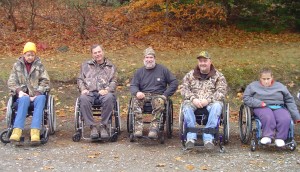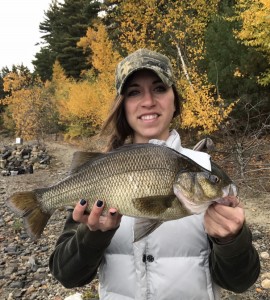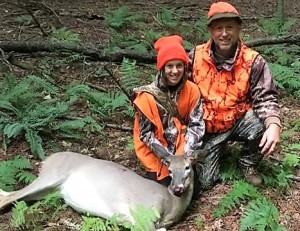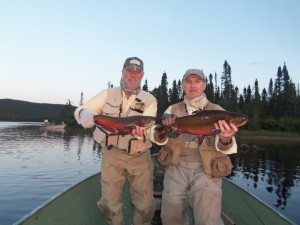Category Archives: Deer Hunting
Paraplegic Deer Hunt went off smoothly
According to Trina Moruzzi, MA Division of Fisheries & Wildlife Paraplegic Deer Hunt Coordinator, twenty one hunters participated statewide in the 3 day paraplegic deer hunt which took place from November 3 through November 5. A total of five deer, one doe and four bucks, were harvested. This translates to a 24% success rate for this year’s hunt. In the past five years, these hunters have averaged around a 25% success rate. Here in the Berkshires, 9 hunters participated this year – 5 in the southern and 4 in the northern Berkshires sites.
The southern Berkshires folks hunted in the Mount Washington area and it was coordinated out of the DCR Headquarters there. The hunters were: Sidney Eichstedt of Lee, Greg Baumli of New Lebanon, NY, Steve Gladding of Westfield, MA, Vyto Sablevicius of Norwich, MA and Erin Ferry of Dighton, MA.
Helpers included: Shaun Smith, Brian Ingerson, Marc Portieri, Greg Arienti, Rick Thelig, Tom Dean, Paul Antonozzi, Fred Lampro, Al Vincent, Paul Mullins and Chuck Pickert, all from the Berkshires or northern Connecticut.
For the 8th year in a row, Chuck Pickert brought his trailer-mounted smoker/grill and cooked breakfasts and lunches for the three days. Tricia Vollmer made the fish chowder and potato salad and other individuals also prepared the desserts and other food needed for the three day event. A lot of friends who own restaurants and businesses donated food and condiments.
On the day that I was there, the lunch menu was: homemade fish chowder, smoked roast pork loin, smoked Vidalia onion gravy, smoked baked beans, and potato salad as well as the home-made deserts.
So how did the hunt go? No deer were taken that first day. The only thing I saw even remotely resembling a deer was an 8 inch toy African eland that Chuck Pickert’s 4 year old grandson Callen brought with him. However, on a subsequent day, Erin Ferry bagged a spike horned buck.
The 4 hunters at the Northern Berkshires site were: Dale Bailey of Clarksburg, David Alderman of Petersburgh, NY, Fred Klausky of Raynham, MA and Shawn Mei of Baldwinville, MA. Volunteer included Rick French, Jay and Stacy Sylvester and others.
They hunted in the Williamstown area and, Dale Bailey got a doe.
DFW Western District Manager Andrew Madden and his staff of biologists; Nate Buckhout, Tammy Ciesla and Jacob Morris-Siegel were on hand at both sites to help out and check in the deer.
In other areas, two bucks were harvested at the Quabbin site, and one buck was harvested at the Devens site.
“Since 1972, this hunt has provided thousands of hours of recreational opportunities for paraplegic sportsmen and women and I am proud to be part of it.” said Moruzzi. She noted that volunteers are integral to the program and thanked them for their enthusiasm and commitment. If you are a paraplegic sportsman or sportswoman interested in participating in the 2017 hunt, contact Trina Moruzzi at trina.moruzzi@state.ma.us or call (508) 389-6318.
Hunters welcome
According to its website (BNRC.org), The Berkshire Natural Resources Council owns over 10,000 acres where one can hike, snowshoe, geocache, fish, birdwatch, paint pictures, take photos, etc. Local sportsmen love the BNRC because it also welcomes hunters to its properties. One of its principles is that land should be open for passive recreation, which has always included hunting. In fact, BNRC actively manages its properties for wildlife’s increase, including game species. It believes there is room to share the land among those who appreciate what it offers.
However, it has a few simple guidelines to keep everyone safe:
- Be aware of the hunting seasons: some type of hunting occurs from mid-October through mid-March; the busiest period is the shotgun deer season, which this year is from November 28 through December 10.
- Through the fall hunting seasons, it is important that every visitor (hunters, hikers, and even dogs) wears bright clothing. “Blaze orange” is the color that shows best in all light conditions.
- Hikers should stay on marked trails and hunters should make sure they know the location of all trails.
- Dog-walkers should be especially careful to keep dogs leashed.
- Give hunters their space: State law protects a hunter’s rights to legally take game, and BNRC supports their right.
As BNRC puts it, “Keeping land is not an easy task. We’re constantly in the field, working with landowners who want to donate land, scouting for new acquisitions, and planning, building, and maintaining trails that give you easy access to nature. We put rafts on the ponds so you can swim and fish. We build bridges and boardwalks over the streams and wetlands. We do all of this with you, and for you…..all of you.”
Each year, the Berkshire County League of Sportsmen (BCLS) gladly makes a donation to this most worthy organization. Now you know why.
No Game Dinner
Around this time of year, the Onota Fishing Club usually has its annual game dinner. However, according to Board Member Clem Caryofiles, it has been cancelled this year. No explanation was given, but I suspect the passing of director Chris Porter last December had a lot to do with it. He dedicated a tremendous amount of his time expertly preparing and cooking the wild game. He was posthumously awarded the BCLS 2015 Sportsman of the Year Award for all of his efforts.
It sounds like the Onota Club will resume having this dinner sometime in the future as Caryofiles noted that they are still taking donations of deer and other game.
Deer Hunting Opportunity for Paraplegic Hunters
For nearly 45 years, MassWildlife has offered paraplegic sportsmen and sportswomen the opportunity to hunt deer in several locations across the state during a special three-day season. This year’s hunt dates are November 3 – 5. Locations include Devens Reserve Forces Training Area (Harvard/ Lancaster), Quabbin Reservation (Belchertown), two properties in northern and southern Berkshire County, and Otis/Edwards Military Reservation (Falmouth).
MassWildlife staff work with volunteers to help place hunters in areas at several hunt locations. When a hunter successfully shoots a deer, the waiting volunteers assist the hunter by retrieving the deer, field dressing it and getting it checked in with MassWildlife staff on site.
Sportsmen and volunteers alike enjoy this opportunity to spend time together in the great outdoors, counting the hunt as successful if they are fortunate enough to see a deer.
In 1972, the deer hunt was held at the Phillipston WMA and the following year in the town of Rowe. The hunt location then moved to Martha’s Vineyard and Nantucket in subsequent years. Due to access issues on the islands, locations in Williamstown and in and around Mt Washington State Forest were utilized for much of the 1980’s and 1990’s with an occasional location in Middlesex County. Since 2000, the Department of Conservation and Recreation has hosted a third site at Quabbin Park in Belchertown. In 2003, a partnership with the US Army at Devens (formerly Fort Devens) resulted in a fourth location for paraplegic sportsmen to try their luck.
Each year, approximately 25-30 paraplegic hunters sign up for the special hunt. In the past five years, these hunters have taken an annual total of 7-8 deer, amounting to a greater than 25% success rate. For a number of these people, it’s the only opportunity they have to hunt, an activity that is an important part of their lives.
According to MassWildlife, last year twenty five hunters with paraplegia participated in the deer hunt from October 29 to 31. Three deer (2 bucks, 1 doe) were taken, which translated to a 12% success rate for the 2015 hunt. Many hunters saw deer and several got the opportunity to shoot. This hunt has provided thousands of hours of recreational opportunities for paraplegic sportsmen and women since 1972. MassWildlife Biologist Trina Moruzzi has been the Hunt Coordinator for the past 15 years. She noted that volunteers are integral to the program and thanked them for their enthusiasm and commitment. DFW Western District Manager Andrew Madden and his staff rarely miss an opportunity to help out. I also enjoy getting a group picture of the hunters for this column annually.
Licensed paraplegic hunters who have an interest in participating in this hunt should contact Trina Moruzzi at (508) 389-6318 or by email at Trina.Moruzzi@state.ma.us for more details. Contact her by October 24 (tomorrow) to ensure you can get your permit in time.
Trail Cam users help scientists study mammals
Trail cameras are used by nature lovers and the sporting community to catch glimpses of Massachusetts’ more elusive, usually crepuscular, wildlife. Hollie Sutherland, a graduate student at UMass Amherst, is studying the feasibility of using a citizen scientist network of trail cameras to study mammals in Massachusetts. Bobcat, mink, moose, and bear are among the seldom seen animals that Sutherland and her colleagues hope to learn more about. In the long run, this citizen science project aims to engage the public in providing photos and videos. Sutherland has developed a survey to determine the level of citizen interest in wildlife, who owns a trail camera, and how they use their trail cameras. She invites anyone over 18 to consider completing a short (5-15 minute) survey. You do not need to own a trail camera to take part. To take the survey, go to http://bit.ly/InterestinNature_TrailCamSurvey. Once completed, you will receive a free Massachusetts Bobcat desktop wallpaper image for completing the survey.
Skeet shooting
In its September newsletter, the Stockbridge Sportsmen’s Club reported that for the 13th year out of the last 14, its skeet team prevailed in the 2016 Tri-Club Skeet Championships. Heading to the Sheffield Club for the final leg on August 28 they were ahead by a scant bird. When the smoke cleared they added another half dozen or so targets to their lead. Bob Cameron and Gary Harrington scored 49 out of 50 birds, while wheelchair shooter, Frank Kline, showed everyone how to overcome adversity as he posted a score of 48. Jim Johnson, Tom Gansowski and Joe Ary all kicked in with 47’s, while Darren Coffy broke 46 targets. Shaun Sullivan, Bob Krupski and Wayne Slosek rounded out the scoring that gave them a total of 461 out of 500 targets for the day. Fancy shooting indeed.
Fly tying classes cancelled
Readers may recall from my September 25 column that the Berkshire Hatchery Foundation was exploring the possibility of having free fly tying classes beginning on October 12 at the hatchery in Hartsville/New Marlborough. Unfortunately, there was not enough interest and the classes will not take place.
Air pistol team
The American Legion Post 125 is sponsoring an air pistol course at its post at American Legion Drive in North Adams. Designed for ages 10 to 18, it will run the 1st, 3rd and 4th Thursdays of the month. Practice will actually take place at the post, thanks to a back drop built by students from McCann Tech. The American Legion helped in getting the equipment for the course. The course is billed as a way to develop positive life skills of responsibility, integrity and teamwork. It should help prepare the students for Olympic level competition. Instructors are Mary Angelo-Roberts, Pat Blackman and Tom Webb. For more information call Mary at (413)441-7624 or Pat at (413)441-1402.
Small game hunting season is upon us
The woodcock hunting season opened last Wednesday and runs through October 29. It reopens on October 31 and runs through November 19. Because the woodcock is classified as a migratory game bird but not a waterfowl, lead shot may be used. However, a Harvest Information Program (HIP) registration is required to hunt them as well as ducks, geese and other waterfowl.
Tomorrow morning marks the opening of duck and Canada goose hunting season in the Berkshire Zone and runs through November 26. Duck hunting season reopens on December 5 and runs through December 24. Goose season reopens on December 5 and runs through December 13. (Although referred to as the Berkshire Zone, its eastern boundary is I-91, Rte 10 and Rte 202.) Check the regulations regarding daily harvests for the various ducks, geese and woodcock.
The pheasant and ruffed grouse hunting seasons open next Saturday and runs through November 26. The daily limit for pheasants is 2, and for grouse it is 3. If hunting a Wildlife Management Area for pheasants or grouse and other small game, you must wear a hunter orange cap. The exceptions are if you are hunting waterfowl from within a blind or boat or if you are hunting raccoons or opossums at night.
Cottontail rabbit hunting season opens next Saturday in Zones 1 – 12 and runs through February 28, 2017. Snowshoe hare season opens next Saturday and runs through February 28 in Zones 1-4. The other zones have differing seasons. The daily limit is 5 cottontails and 2 hares.
The gray squirrel season, which opened on September 12 in our zone is ongoing and ends on January 2, 2017. The daily limit is 5. Rabbit, hare and squirrel hunting seasons are closed during shotgun deer hunting season.
Next Saturday, the coyote hunting season opens and runs through March 8, 2017. There is no daily limit on them but they must be checked in at an official check station or online with MassWildlife.
It is important that hunters check the Massachusetts Fish & Wildlife Guide for a listing of all of the hunting regulations and remember that hunting on Sundays is prohibited.
Brake for moose
As you may be aware, there have been at least two moose/auto accidents in the Berkshires recently. The Berkshire Eagle has covered them and as a public service, cautioned drivers to be on the lookout for them especially while driving at night. This is important and bears repeating.
Hitting a moose with a car is dangerous and the results can be tragic. In September and October, cows come into their breeding cycles and they become reckless and travel into residential areas or across major highways.
Because they have no predators, moose can be oblivious to the potential dangers posed by automobiles and most people are unaware of the number of moose in our midst.
Be particularly alert, especially at night during the fall breeding season. Moose will step out onto a roadway without showing the slightest concern for oncoming traffic. With their long legs, a vehicle hitting a moose take the legs out from under them, flipping their bodies onto the car’s windshield or roof. The dark body is difficult to see and its eyes are much higher in the air than the level of a pair of white tail deer eyes. Always use your bright lights when traveling at night when there is no oncoming traffic.
Youth deer hunt
MassWildlife reports that statewide there were 1,236 youth deer permits issued this year for the special Youth Deer Hunt Day which was on October 1. Of that total, 698 permits went to youths aged 12 to14 year olds and 538 permits went to those aged 15 to 17. Last year, the first year of the youth hunt, 1,339 youths participated.
As of this writing, there were 118 deer reported online. MassWildlife did not yet have the season total as there are some physical check stations that are not online. It is expected that the final number could reach between 120 and 125. Last year 146 deer were harvested during the Youth Deer Hunt Day.
The accompanying picture is of 12- years old Juliann Lawson with her proud dad, Dan, and her first deer. She harvested the adult doe in Williamstown where her grandfather, Bob McCarthy, let her hunt at his favorite stand. According to Dan, it took about an hour to see the deer, and she didn’t miss.
Incidentally, Dan Lawson is an avid sportsman and valued delegate of the Berkshire County League of Sportsmen (BCLS), representing the East Mountain Sportsmen’s Club. Juliann’s grandpa Bob McCarthy is also a well known local sportsman and delegate to the League. He was named the 1987 BCLS Sportsman of the Year. With mentors like that, how could she not succeed in bagging her deer. It is great to see the hunting tradition passed on from generation to generation.
I hope to have the names of other successful youth deer hunters next week.
Fall trout stocking
Andrew Madden, DFW Western District Manager recently reported that they will not be stocking the East Branch of the Westfield River this fall due to low water conditions. They do intend to stock the Deerfield River as well as the following lakes/ponds: Onota Lake, Pontoosuc Lake, Laurel Lake, Stockbridge Bowl, Goose Pond, Richmond Pond, Lake Buel, Big Pond, Otis Reservoir, Windsor Lake, Windsor Pond, Ashfield Pond, Littleville Lake, North Pond, Upper Highland Lake and Norwich Lake.
Over 60,000 trout to be stocked statewide this fall
In his most recent report to the Berkshire County League of Sportsmen, DFW Western District Manager Andrew Madden reported that fall trout stocking season should be beginning this week and be completed by the second week of October depending on water conditions. This fall more than 60,000 rainbow trout that are 12 inches or longer will be stocked in Massachusetts water bodies.
According to MassWildlife’s Chief of Hatcheries, Ken Simmons, the ongoing drought should not have a major impact on fall stocking even if it persists through the fall season. “Drought conditions will likely result in the curtailment of some river and stream stocking due to low flows but we do not anticipate there will be much of an impact on lake and pond stocking,” Simmons said. There are more than 90 lakes and ponds on the fall stocking list and only 14 rivers and streams. MassWildlife fisheries biologists will assess the condition of each waterbody before making a final decision about stocking.
The two rivers in our area that are usually stocked in the fall are the Deerfield River and the East Branch of the Westfield River. According to Madden, stocking in the Westfield River could be iffy unless water conditions greatly improve.
Simmons noted that the drought has made operations at MassWildlife’s five hatcheries more challenging but has not affected the number of fish available for this fall’s stocking. In fact the 60,000 rainbow trout that will be stocked is 10,000 more fish than the original fall goal.
As was the case with the 2016 spring season, anglers will be able to view daily stocking reports this fall by visiting Mass.gov/Trout. They can search for a specific waterbody or town using the sortable list, or explore new fishing spots by using the map feature.
Airboat crew banding waterfowl
During dark nights of late summer and early fall, MassWildlife biologists take to the marshes and rivers in an airboat to capture ducks for banding. This technique, called night-lighting, allows biologist to sample ducks all over the state. Unlike traditional bait trapping, which limits sampling to a few sites, night-lighting with the airboat allows biologists to capture ducks in the Berkshires one night, on the Cape the next night, and in Worcester County the night after that.
Ducks are placed into crates according to their size, then banded and released. Banding records are submitted to the Bird Banding Lab of the U.S. Fish and Wildlife Service. The data then become available to state and federal biologists who assess the status of waterfowl populations. It can also be used to monitor movements, wintering areas, and longevity of various species.
The airboat is used to navigate shallow marshes where ducks roost among vegetation at night. The loud noise generated by the 350 horsepower engine and the spotlights onboard confuse the ducks and allows biologist to get close enough to net them. Because of the noise, most sites are visited only once per season and boating rarely goes beyond 11 pm. Successful night-lighting requires a dark sky, so trips are shorter early in the season due to the late sunset. Moonlight is also a factor; airboat trips must be planned to avoid the brightest phases of the moon.
This year, some sampling sites may not be available due to the ongoing drought. While the airboat doesn’t need much water to get around, it needs some. Night-lighting concludes at the end of September but in the meantime, if you hear what sounds like an airplane stuck in a swamp, it just might be the MassWildlife airboat.
Boat safely
Paddlers in kayaks and canoes must wear life jackets from September 15 to May 15 every year. According to the Massachusetts Environmental Police, most boating fatalities in the Commonwealth result when boaters fail to wear life jackets while in small craft in cold water or cold weather. Waterfowl hunters using canoes or kayaks are reminded that this law also applies to them.
Youth Deer Hunt is October 1
It is not too late to get your child enrolled into the Youth Deer Hunt program. The Youth Deer Hunt Day provides young adults aged 12–17 with an opportunity to hunt deer with their own deer tags during a special single-day season that precedes the Commonwealth’s annual archery, shotgun, and muzzleloader seasons. Hunters are reminded that all shotgun deer season regulations apply on the Youth Deer Hunt day. Youth Deer Hunt Permits are free, but must be obtained at a license vendor or MassWildlife office. The permits and tags are only valid for the Youth Deer Hunt day and cannot be used in later seasons. All youth hunters and any accompanying adults must wear a minimum of 500 square inches of blaze orange on their chest, back, and head.
Whitetails Unlimited Banquet
The Berkshire County Chapter of Whitetails Unlimited will be holding a banquet on Saturday, October 1 at the Stockbridge Sportsmen’s Club, Route 102, in Stockbridge. Social hour begins at 5pm and buffet dinner at 6:30 pm. There will be games and raffles. For tickets or information, contact Keith O Neil at (413)717-1945 or buy online at www.whitetailsunlimited.com.
Free fly tying classes
The Berkshire Hatchery Foundation is exploring the possibility of conducting free fly tying classes at the Berkshire Hatchery in Hartsville/New Marlborough, MA. Depending on interest, it will be conducted on Wednesday evenings beginning October 12 at 6 pm. Initially, the class size will be limited to six. Tools and materials will be provided. If interested in enrolling or if you have questions contact Will Regan at willregan3@gmail.com or me at the below address. I will report in a future column if there is enough interest to hold the classes.


![IMG_9450[1]](https://www.berkshireoutdoorsman.com/wp-content/uploads/2016/11/IMG_94501-225x300.jpg)


